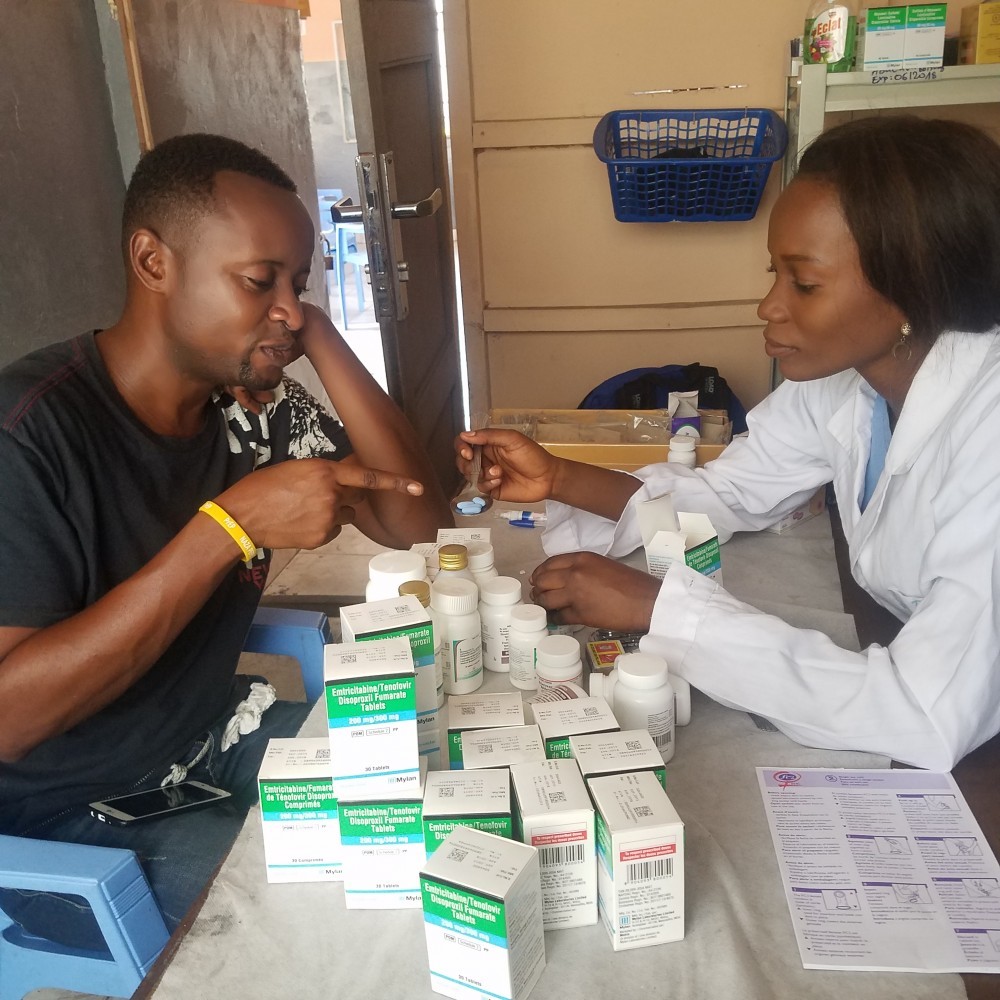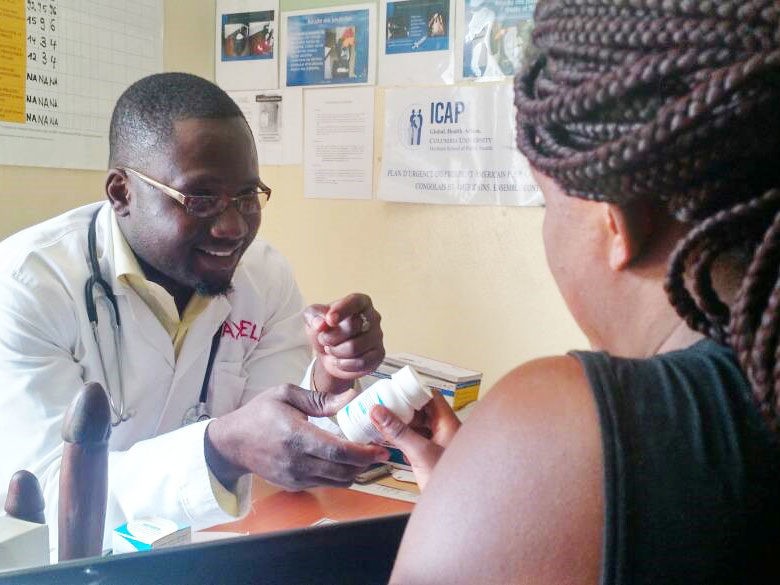Something revolutionary in HIV prevention is happening in Central Africa. Pre-exposure prophylaxis (PrEP) is being implemented for the first time in the Democratic Republic of Congo (DRC).
PrEP is the use of antiretroviral drugs (ARVs) by HIV-uninfected persons to prevent the acquisition of HIV. People at on-going, substantial risk of HIV infection are offered PrEP as part of a combination approach to HIV prevention that includes repeat HIV testing, promotion and provision of condoms, screening and management of sexually transmitted infections, adherence support, and risk-reduction counseling.
ICAP is collaborating with the Ministry of Health and the U.S. Centers for Disease Control and Prevention (CDC) to offer PrEP at seven health facilities in Kinshasa and Lubumbashi—DRC’s two largest cities—through a CDC Global Technical Assistance award funded by the President’s Emergency Plan for AIDS Relief (PEPFAR).
The initiative is focused on planning, designing, and implementing PrEP services for key populations in DRC, including sex workers, men who have sex with men (MSM), transgender persons, and people who inject drugs. Key populations are at an increased risk of contracting and spreading HIV.
“I run risks every single day,” said one sex worker who is receiving PrEP at the Lubumbashi clinic. “Because PrEP is effective, it will give me extra protection against HIV, and allow me to do my job safely.”
The introduction of PrEP is also empowering for health care workers who serve key populations. “I’m honored and proud to be one of the first health care workers to provide PrEP in the DRC,” said a health care worker at the Edith Cavell Clinic in Kinshasa. “It’s a good feeling because it shows that we are fighting HIV in all ways. We’re seeing clients adhere to their medication and tell others about it. The demand for PrEP has been increasing, and we see clients acting as PrEP ambassadors to their friends, families and sex partners.”
All ICAP-supported facilities in DRC provide the full package of HIV care and treatment services, including prevention of mother-to-child transmission, integrated tuberculosis and HIV care, and support for survivors of sexual and gender-based violence. Since 2014, ICAPsupports community- and facility-based HIV services tailored to the needs of key populations in Kinshasa and Haut Katanga, including psychosocial support and mobile testing and referrals. The experience, relationships, and reputation built by ICAP and its partners in serving key populations formed a strong foundation for the launch of PrEP services.

ICAP plans to conduct an in-depth evaluation of the new PrEP services at all seven sites, assessing PrEP patient screening, eligibility, uptake, and retention outcomes, as well as the feasibility and acceptability of PrEP among both patients and providers. ICAP will share the findings with stakeholders at dissemination meetings, and plans to have the results published in peer-reviewed journals to inform and advance PrEP implementation in sub-Saharan Africa and beyond.
“We don’t have a lot of data on the use of PrEP in resource-limited settings, so we are very excited to learn from this experience and to understand how HCW feel about providing PrEP and how clients feel about taking daily medications to lower their risk of acquiring HIV infection,” notes Elaine J. Abrams, MD, ICAP’s senior research director and principal investigator of the Global Technical Assistance project. “We know even less about attitudes toward, satisfaction with, and barriers to PrEP in these settings, so this evaluation will provide critical information that should inform the national programs as they plan to implement and scale up PrEP services, and point the way to bringing PrEP to more people in the country.”
PrEP services build on ICAP’s deep collaboration in HIV prevention, care, and treatment for those most affected by HIV in DRC. ICAP began working in DRC in 2010 on a CDCproject to support HIV prevention, care, and treatment services at health facilities in Kinshasa and Katanga provinces, in partnership with the National HIV Control Program, National Tuberculosis Program, National Reproductive Health Program, and the National AIDS Reference Laboratory. The creation of programs to address the specific needs of key populations is an important development in efforts to reach the UNAIDS 90-90-90 targets by 2020.
“Here in DRC, HIV prevalence is dramatically higher among sex workers and MSM. In the facilities that ICAP supports, eight percent of sex workers and nine percent of MSM test positive, compared to the overall one percent of the general population,” said Tania Tchissambou, MD, technical director for ICAP in DRC. “Sex workers and MSM are precisely the groups most likely to face stigma and discrimination in the health care setting, so implementing our PrEP package—which includes clinical PrEP training, robust clinical operating procedures, job aids, and monitoring and evaluation tools—is critical to improving HIV outcomes.”
ICAP’s Global Technical Assistance project on PrEP for key populations is active in five countries, and the package of training materials, tools, and job aids is featured on ICAP’s website in English, Spanish, French, and Portuguese.
PrEP is already making a difference in the lives of people at risk, with adherence evoking feelings of empowerment that come with the added layer of protection against HIV.
“PrEP offers a way for me to take control of my life and stay HIV-negative,” said one Kinshasa PrEP patient. “Before starting PrEP, I had two partners. One of them had several other partners that were HIV positive, but I stayed with him because he gave me money. When I heard about PrEP through my peers, it was a wake-up call. I decided to learn more about it at the clinic and I accepted to take it right away to protect myself.”








